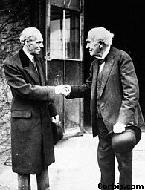 |
|
 |

|
ACHIEVING COMPARATIVE ADVANTAGE
|
|
Innovation * Entrepreneurship * Low Unit Costs * Imaginative Marketing
|
 |
| E=MC2 |
|
| LAWS OF BUSINESS
In the physical world there are immutable biological, chemical, and physical laws that govern. Why is it, then, that in the business world every academic, consulting practitioner, and retired executive continually discovers meta-physical prescriptions for success. Lone Tree believes that success in business can be simplified and reduced to immutable laws. By doing so success on the playing field becomes a matter of block and tackle execution, not technical cunning or the ability to levitate.
|
The Four-Legged Stool
Everyone subject to disciplining, competitive market forces or stakeholder demands must strive to achieve competitive advantage, to survive and thrive. Lone Tree visualizes a four-legged stool of having an innovative product portfolio, low relative unit costs and imaginative use of marketing. The fourth leg of the stool is an entrepreneurial culture where leadership and people as assets dominate.
|
|
 |
| Baseline, Growth, Future Pacers |
|
| Leg #1--Innovative Product Portfolio
A portfolio consists of a mix of base-line, growth and future pacing products. The BASE is those products currently responsible for survival. GROWTH products are necessary over the mid-term to grow and diversify. FUTURE PACERS are products and services key to long term success and that must be moved forward. There are many graphical ways to view the Portfolio, but the central issue is innovation and sustainability within a competitive landscape. |
 |
| Declining Unit Costs Over Time |
|
| Leg #2--Low Average Unit Costs
Many firms cannot prove their unit costs nor are they sure of the relative contributions to profit. Traditional accounting fails management. The "Value-Proposition" depends on continuously achieving lower and lower average unit costs. It is imperative to experience a declining cost curve over time. Any comparative advantage that uses the other three legs of the stool to compensate for cost inefficiency will eventually threaten survival. |
Leg #3--Imaginative Marketing
The singular purpose of every business is to get and retain customers. Marketing in the last 20-years has become advertising-driven and the direct sales force concept has been abandoned in an embrace of alternative channels. The 21st Century will necessitate reclaiming best past practices and leveraging digital multi-media. |
|
 |
| Innovation & Entrepreneurship |
|
| Leg #4--Entrepreneural Culture
Peter Drucker suggested being the "first-est with the most-est" necessitated innovation and entrepreneurship. The 21st century Post-Industrial Society demands greater creativity and leadership from executives and owners. It pleads for a company culture that harnesses the energy of human assets both employee, customer and supplier. Most companies articulate the objective but have difficulty maintaining a sense of entrepreneurship as they grow in size.
|
SUMMARY
Demand for a product and financial success are derived by the obsessive pursuit of four fundamentals:
1. A portfolio of innovative products whose value proposition is continually improved;
2. A ruthless pursuit for low unit costs and appropriate scale;
3. Marketing that starts with getting a customer and proceeds to the satisfaction of needs, and
4. An organizational culture dominated by entrepreneural spirit, leadership and an a recognition that people (employees, customers, suppliers) are the only appreciable assets a firm can leverage.
|
|
|
For Additional Information, Contact: Francis M. Miller, Director, Lone Tree Consulting
Mailing Address: U.S.P.O #143, Franktown, Colorado, USA 80116
Telephone: 1-303-918-3406 or E-Mail:
|
|
|